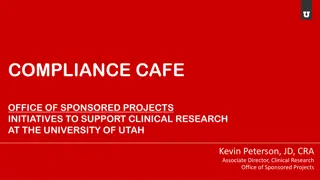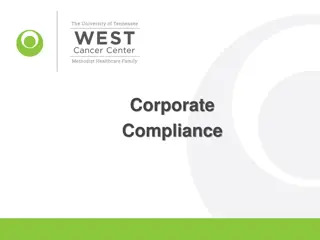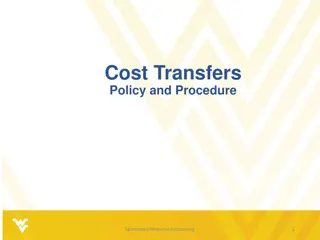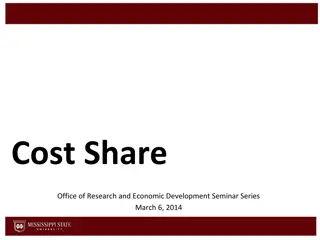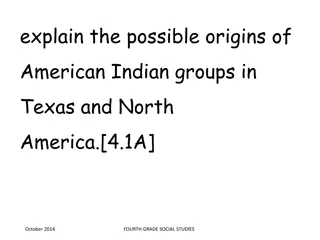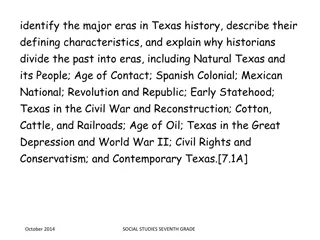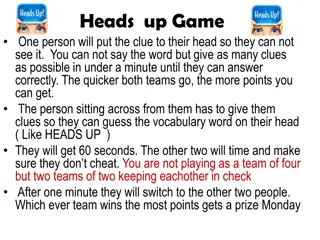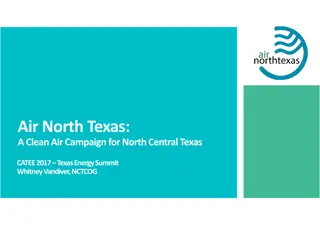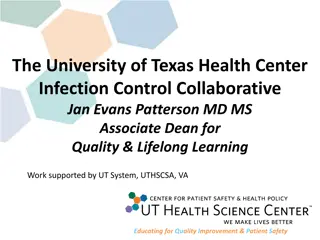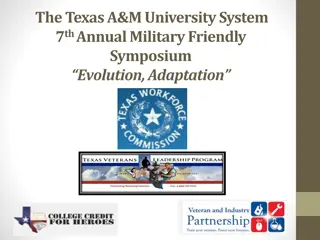Sponsored Project Compliance at University of North Texas Health Science Center
Roles, responsibilities, and allowability of costs in sponsored projects are crucial to ensure accurate accounting and honest spending. Various institutions have faced enforcement issues due to non-compliance, highlighting the need for proper oversight and adherence to regulations to avoid legal repercussions and financial penalties.
Download Presentation

Please find below an Image/Link to download the presentation.
The content on the website is provided AS IS for your information and personal use only. It may not be sold, licensed, or shared on other websites without obtaining consent from the author. Download presentation by click this link. If you encounter any issues during the download, it is possible that the publisher has removed the file from their server.
E N D
Presentation Transcript
Sponsored Project Compliance Roles, Responsibilities and Allowability of Costs University of North Texas Health Science Center Office of Grant and Contract Management
We Are All Responsible Claimants and recipients of government money share responsibility for honest spending and accurate accounting
Enforcement Climate No organization wants to become the poster child for wrongdoing Northwestern ($5.5M), Hopkins ($2.6M) & Harvard ($2.4M) effort Penn informed consent & conflict of interest Mayo Clinic ($6.5M) & Yale ($7.6M) cost transfers, effort, cost sharing Rush ($1M) clinical trial billing UAB ($3.4M) overstated research effort Florida ($19.9M) effort, cost sharing These cases, and many others, have brought considerable unwanted attention to research institutions
Enforcement Climate Increasing coordination among federal and state law enforcement officials Greater degree of Congressional oversight More litigation Whistleblower actions False statement criminal investigations, charges Class actions More resources, tools, investigative techniques, data mining Heightened financial pressure Agency priorities
Enforcement Climate Federal sponsors actively engaged in auditing grants Audits have specifically focused on labor charges Labor charge audits involved interviews to determine whether: Labor charges documented were actually incurred The type of work performed was consistent with award scope of work
PIs Are Under Investigation . . . our recordkeeping was far from perfect, and to defend against a charge that all $2.4M was spent correctly would have been very difficult.
Universities Are Under Investigation The university overcharged HHS [$19.88M] on hundreds of grants for the costs of employee salaries without possessing documentation to support the level of effort claimed for their work. U. Of Fla. To Pay $19.9M To Settle Grant Overcharge Claims Share us on: By Nathan Hale Law360, Miami (November 20, 2015, 9:35 PM ET) -- The University of Florida will pay $19.88 million to the federal government to settle allegations brought under the False Claims Act that it improperly charged for salary and administrative costs under hundreds of federal grants, the U.S. Department of Justice announced Friday. The government s claims covered grants issued by the U.S. Department of Health and Human Services to the university between 2005 and 2010 and were administered from campuses in Gainesville and Jacksonville, according the government. The settlement was agreed upon before the filing of a complaint, and no determination of liability was made on the allegations, according to the government. The university said in a statement that the problems stemmed from bookkeeping deficiencies that were discovered almost nine years ago that it has since addressed in its systems and procedures, in full cooperation with federal authorities. The settlement will be paid from investment earnings and other nonstate funds. That money would have invested in research, but much of it had been set aside in anticipation of the settlement after the problems were identified, school officials said. UF recognized that certain compliance systems had weaknesses and was in the process of addressing them when HHS began its audit years ago, UF Vice President for Research David Norton said in a statement. UF has added automated support systems, personnel and training to make its compliance systems fully responsive to the expectations of federal agencies. Federal officials claimed that the university overcharged HHS on hundreds of grants for the costs of employee salaries without possessing documentation to support the level of effort claimed for their work. Some administrative costs for equipment and supplies were also directly charged against federal regulations for the grants, and the university allegedly inflated costs for services performed by affiliate Jacksonville Healthcare Inc. on some grants, the government claimed. The monies utilized by HHS to fund important medical research and clinical programs across the nation are both precious and limited, Principal Deputy Assistant Attorney General Benjamin C. Mizer, head of the Justice Department s Civil Division, said in a statement. Today s settlement demonstrates that the Department of Justice will pursue grantees that knowingly divert those funds from the projects for which they were provided. HHS awards more grant money than any other federal agency, HHS Regional Inspector General for Audit Lori S. Pilcher said, noting in a statement that prudent oversight of those funds is absolutely essential. The University of Florida s research budget totals $6 billion for a 10-year period and continues to grow, it said. It noted that the settlement payment, which is due within 14 days, represents about 2 percent of the total funding it received from HHS. The audit results have also not had a negative effect on the 6
Shared Responsibility for Compliance You are part of an institution Your role is part of a whole You share responsibility
Roles and Responsibilities (R&R) Principal Investigator & Departmental Support Develop and prepare grant applications and budgets Signs and submits the External Proposal Transmittal Form (EPTF) prior to proposal submission Review contracts for scientific aspects Complete and maintain documentation of all technical aspects of awards Administers award in accordance federal guidelines. Review sponsor guidelines for terms of award and ensures adherence to sponsor guidelines and institutions policies. Office of Grant and Contract Management Review and submit grant applications Ensure EPTF has been completed and is on file prior to proposal submission Draft, negotiate, sign contracts Award set up of sponsored project and notifies PI/Departmental Support of new projID for sponsored project. Review sponsor guidelines for terms of award and ensures adherence to sponsor guidelines and institutions policies. Provides guidance to PI/Departmental Support regarding allowability of costs.
Roles and Responsibilities (R&R) Principal Investigator & Departmental Support Initiate, review and approve salary distributions, purchase requisitions, check requests, expense reimbursements, and purchasing card transactions to appropriate sponsored projects. Notify OGCM of changes in effort to sponsored projects Initiate request for cost transfers Initiate rebudget requests Timely submission of cost share supporting documentation, where applicable Review and approve subcontractor invoices Reviews and certifies effort reports Office of Grant and Contract Management Review and approve expense transactions on sponsored projects. Work with PI to determine if changes in effort need sponsor approval Review and process cost transfer request Review and process rebudget requests Track and account for cost sharing Subrecipient monitoring Manages the distribution and certification of effort reports
Roles and Responsibilities (R&R) Principal Investigator & Departmental Support Participate in audits as required/requested For projID s in the final year, complete necessary documents for close out Requests for No Cost Extensions / Notification of Continuation Funding to OGCM Preparation of carryover request (if approval required) Provide Carryover Request Letter Provide Carryover Budget Complete technical reporting requirements Resolution of overdraft or unused funds on sponsored projects Office of Grant and Contract Management Audit management (internal and external) Email notification of approaching end dates Preparation of ALL financial reports or invoices For projID s in the final year, complete necessary documents for close out Submission of No Cost Extension Requests to Sponsor Submission of Carryover Request to Sponsor Maintains active registrations with federal websites and databases
Roles and Responsibilities (R&R) Principal Investigators and Co-Investigators: Eligibility, Roles and Responsibilities Located on OGCM website https://www.unthsc.edu/research/wp- content/uploads/sites/21/PI-Roles-and- Responsibilities.pdf 11
Helping you manage all the R&R OGCM, PI and Dept will begin having mandatory projID set up meetings when new projects are established Review award terms and conditions Review key personnel effort for new and existing awards to determine if changes in effort are needed Review OGCM Sponsored Project handbook to ensure PI and department understand all compliance related matters to manage the project 12
What makes an expense Allowable Monitoring awards ensures expenditures are allowable, allocable, reasonable and necessary to a specific sponsored project in accordance with award budget, sponsor guidelines, and HSC policy. Allowable: A cost is allowable to a project if the costs are: Reasonable; Allocable to the specific project; Treated consistently in like circumstances; and Conform to any limitations of the cost principles or the sponsored agreement. Reasonable: Costs must reflect what a prudent person would pay. Allocable: A cost is allocable to a project if goods or services involved are chargeable or assignable in accordance with the relative benefits received by the projects. In order to be allocable a cost must be treated consistently in like circumstances. Necessary: Was the cost necessary in order to complete the objectives of the project 13
What is Effort Reporting? Effort Reporting is the method of certifying the effort required as a condition of the award has actually been completed Effort is defined as the amount of time spent on a sponsored research project in which salary is directly charged or contributed (cost-share) during a specified period of time 14
What is Effort Reporting? - Continued 40 hour/week IS NOT the definition of 100% effort from which percentage of research effort is certified 100% effort is an employee s total time actually spent completing all aspects of their position Effort certification should accurately reflect the work performed. 15
What is Cost-Sharing? Cost-sharing is the portion of the total sponsored project s costs that are paid by the institution, rather than by the sponsor. There are 2 kinds of cost-sharing: Mandatory Committed is required by the sponsor and documented in the proposal. NIH, CDC, DOJ, HHS, CPRIT Voluntary Committed is not required by the sponsor but is included in the proposal. In the event the proposal is funded, your voluntary committed becomes mandatory. 16
Why is Effort Reporting Necessary? Compliance Comply with the State of Texas requirements Uniform Grant Management Standards (UGMS) Comply with federal regulations (OMB Uniform Guidance, 2 CFR 200.430) University Policy Effort Certification Report System (ECRS) is the tool we use to ensure our compliance 17
What is the ECRS? Part One Online system within EIS used to capture salary expenditures, effort, cost sharing and salary cap data. Management tool used to verify the amount of salary paid on a project, cost share and effort reported. Part Two Effort Reporting Certification 18
The Effort Certification Process Certification process is complete PI logs in to review the report for accuracy EPar PI reviews Monthly Management Reports for accuracy End of OGCM sends out email notification processed to charge Actual Salary Cost to projects Semester rolls around PI agrees PI disagrees sends ECM comments and adjustments are made PI certifies online 19
Part 1 - Why use Monthly Management Reports? EIS report tool used to track payroll activity by project or by employee for amounts paid by sponsors (direct charge) and institution (cost share) Easy way to identify people paid on wrong project Easy way to identify changes in effort on projects Track burn rate of effort on project and for cost sharing Easy way to see effort committed to multiple sources 20
Part 2 When do we have to certify? Three times per year Fall Spring Summer Effort reports should be certified within a reasonable amount of time Reminder emails will be sent with escalation if certifications are not completed timely 21
What happens if we dont complete the certification? Failure to complete the effort report leaves the university in jeopardy of disallowance of the salary costs on Sponsored Projects Erroneously certifying effort can be viewed as fraud and subject to penalties
Who has to certify Effort? Effort report must be signed by a person having direct knowledge of the work that was performed Principal Investigator Certification by a department administrator or other staff member is NOT permitted. https://www.unthsc.edu/research/grant-and- contract-management/effort-reporting- certification-system/ 23
What does effort reflect? Effort must accurately reflect the work performed Employees total compensated activities Both federally assisted and all other activities Supports the distribution of the employee s salary or wages among the employee s activities (federal and non-federal, sponsored and non-sponsored) NOT budget driven, but should be consistent with the distribution in the budget 24
Effort Reporting Must Be Current Charges to Federal awards for salaries and wages must be based on records that accurately reflect the work performed. PIs are required to seek prior approval from NIH before they reduce the effort of key personnel named in the Notice of Grant Award under the following circumstances: Key personnel withdraw from the project entirely Key Personnel are absent from the project during any continuousperiod of 3 months or more Key Personnel reduce time devoted to the project by 25% or more.
Changes to Effort The PI is required to inform OGCM of all changes to effort on active projID s OGCM will work with the PI to determine if the change requires sponsor approval and if changes to payroll are required
How Does a PI Know What to Certify? PIs are responsible for knowing what effort has been spent on their grants PIs should not certify unless they have reviewed effort and can support it Lab notebooks, time sheets, regular lab staff meetings, raw data, etc. OGCM will carefully scrutinize, follow-up and audit certifications
Per NIH, A Lab Notebook Is Complete record of procedures, reagents, data, and thoughts to pass on to other researchers Explanation of why experiments were initiated, how they were performed, and the results Legal document to prove patents and defend your data against accusations of fraud Scientific legacy in the lab
A Lab Notebook Is Not A journal A record of communications A place to compile lab protocols/manuals Yours to take home
Different Types of Lab Notebooks Bound/Stitched Notebook Loose Leaf/ Three Ring Binder Notebook Electronic Notebook
What Goes in the Lab Notebook Notebook name Inside cover or cover page - Your name and year - General project name and ProjID # - Lab mailing address Table of Contents Body of notebook - Experimental entries
Experimental Entries Date Title Hypothesis or Goal: Brief statement of purpose Background How: Protocols, calculations, reagents, equipment Observations: - All that happens (planned or unplanned) - Raw experimental data - Taped in information or reference to data location Data analysis - Processing or raw data, graphs, interpretations Ideas for future experiments
The Details of How Reagents: source, product number, lot number, expiration date, how and where stored Solutions and how they were made Cells used: type, source, passage number, growth medium Instruments: type, name, location, serial number Number and volume of washes Centrifuge speeds and duration of spins Heating rates and levels of agitation Time between and during steps Gel percentages Type of water used
Ethics All data goes in to the notebook - Even bad data points or outliers - Failed experiments or contradictory experiments No pages come out of the notebook - Do not take any pages out or remove any data - Do not skip pages in your notebook -Cross out any unused parts of a page Correct mistakes, do not remove them - Cross out mistakes with a single line - Paste in corrections without covering anything - Sign and date all corrections Honesty is the best policy
Questions? Contact OGCM Kristi Lemmon Senior Compliance Manager Asst VP Research Administration Kristi.lemmon@unthsc.edu LeAnn.forsberg@unthsc.edu (817)735-0424 (817) 735-0429 LeAnn Forsberg














